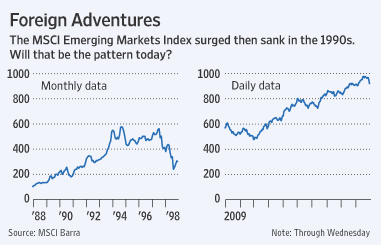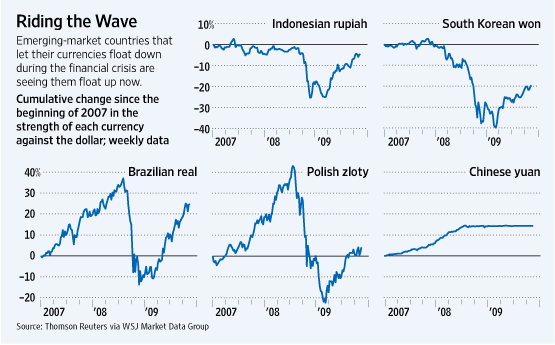November 13th 2009
Emerging Markets Bubble Continues to Inflate, but for How Long?
Yesterday, emerging markets (proxied by the MSCI Emerging Markets Index) recorded their biggest fall since July, ending a week of solid gains. Still, this one-day slide of 1.4% pales in comparison to the nearly 100% gain that the index has achieved since bottoming last March. In other words, while investors might be starting to pull back, the direction of asset prices is still upward.

As for what’s causing this across-the-board appreciation, that was the subject of my previous post (Inverse Correlation between Dollar and Everything Else…Still), in which I merely stated the obvious; that the Fed’s year-long program of negative real interest rates and quantitative easing (i.e. wholesale money printing) has unleashed a flood of cash into global capital markets. Since we’re not just talking about the Dollar, here, it makes sense to point out that the Fed’s easy money policies have been copied by Central Banks in most other industrialized countries, including the UK, Canada, Switzerland, Sweden, and to a lesser extent, the EU.
As for why emerging market assets and currencies seem to be outpacing appreciation in other asset classes, that’s also not difficult to explain. First of all, by some measures, emerging market stocks have hardly outperformed other assets. Oil, for example, has risen by 131% in less than a year, to say nothing of other commodities. Still, by other measures, growth has been remarkable. Most emerging market stock indexes and currencies have fully erased (or come close to erasing) the losses recorded during the peak of the credit crisis. Bonds, meanwhile, have gone one step further. Yields are collapsing, and prices have exploded – by 25% in the last year, sending the JP Morgan Emerging Market Bond Index to a new record.

Is it safe to call this a bubble? Intuition would suggest so; given that all assets are rising across the board, without regard to particular fundamentals, it would seem that only a herd/bubble mentality could offer an explanation. Some analysts, in fact, have given up completely on fundamental analysis, instead using fund inflows (i.e. investor demand) to predict whether some emerging market assets will continue rising. As Nouriel Roubini (the NYU economist that famously predicted the credit crisis) summarizes: “Traders are borrowing at negative 20 per cent rates to invest on a highly leveraged basis on a mass of risky global assets that are rising in price due to excess liquidity and a massive carry trade.” P/E ratios are nearly twice as high in some emerging markets, compared to stocks in the S&P 500.
On the other side of the equation are the bulls and the efficient market theorists.”By historical price-to-earnings ratios — the ratio of stock prices to per-share profits — these levels can be justified, if the economic recovery continues. With massive layoffs, business costs have been cut sharply. “The hope is that when consumers and companies start spending, the added sales will drop quickly to the bottom line [profits].” Other proponents argue that the rise in asset prices is exactly what the Fed wants, since it implies that the markets are once again characterized by stability and liquidity.
Regardless of whether growth materializes, however, that doesn’t change the fact that the free ride can’t and won’t last forever. At some point, Central Banks will be forced to raise interest rates and start withdrawing Trillions of Dollars from global capital market. This will cause the Dollar to rise, and investors to rapidly unwind their carry trade positions. Warns Roubini, “A stampede will occur as closing long leveraged risky asset positions across all asset classes funded by dollar shorts triggers a co-ordinated collapse of all those risky assets – equities, commodities, emerging market asset classes and credit instruments.”
If the tech-bubble and real-estate bubble taught us anything, it is that there is no free lunch in the markets. It is not possible for all investors in all assets classes to simultaneously win. At least, in the long-term. In the short-term, meanwhile – it pains me to say this – let the party continue. My only warning is this: when the music stops, don’t be the one caught with your pants down…




November 20th, 2009 at 9:46 pm
I really enjoy reading the Fundamental Analysis you provide! A+ Material equivalent to viewing other top Analysis sites.